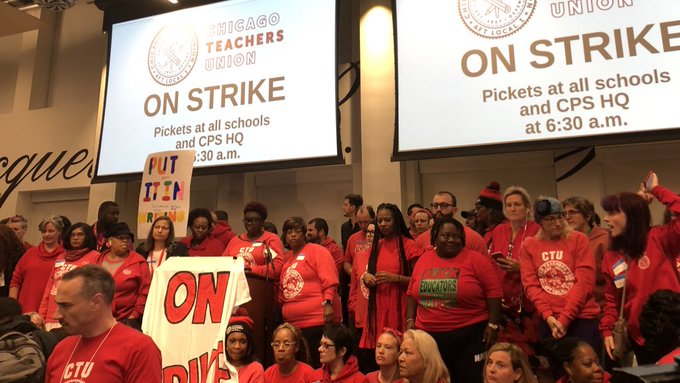“We mean business. It’s got to be about shifting and transforming the infrastructure of inequity.”
By Julia Conley, staff writer for Common Dreams. Published 10-19-2019

Photo/: Midwest Unrest/Twitter
On Friday, the second day of the Chicago Teachers Union strike, union leaders said that contract negotiations have seen some progress but that teachers and Chicago Public Schools have more work to do before achieving “educational justice” for the city’s 300,000 public school students—not just raises for teachers.
Before heading into negotiations Friday morning, CTU President Jesse Sharkey said the city offered $8 to $10 million to reduce class sizes—an improvement over the $1 million it initially offered.
But with lingering disagreements over staffing schools sufficiently and providing competitive pay to attract the highest quality teachers possible, Sharkey told the press the two sides are “not there yet.”
The 25,000 CTU members and the 7,000 teachers’ aides, custodians, and security guards who joined the strike—have won praise for focusing their demands on making structural changes to the city and school district, instead of just teacher raises.
“It’s a short-term disruption for what we hope is a long-term commitment to educational justice in this city,” Sharkey told reporters.
The teachers are calling for affordable housing for students and are treating their negotiations with the city as an opportunity to “bargain for the common good.”
“We mean business,” Stacey Davis Gates, vice president of the Chicago Teachers Union, told reporters. “It cannot be about politics and personalities. It’s got to be about shifting and transforming the infrastructure of inequity.”
The reason Chicago Teachers and School Staff are striking is because the city have FAILED our youth. We are fighting for housing justice, because we understand that our poor and marginalized families WILL NOT be CPS families if they cannot AFFORD to live in Chicago!
— · (@vox00_) October 17, 2019
This is beautiful: just as workers cannot solve their collective problems individually at work, we cannot solve our collective social problems without uniting our struggles https://t.co/nxRSDS3CgL
— Michal Rozworski (@michalrozworski) October 18, 2019
16,450 Chicago students are homeless. Families are being displaced from their school districts. Teachers cannot afford to live where they teach.
Without tackling affordable housing, too many Chicago children will be left behind. #BargainHousingJustice https://t.co/FeTWzrt0ZL
— For the Common Good #CTUSEIUstrike (@bcgproject) October 18, 2019
The union is also demanding enough funding to pay at least one nurse for each of the more than 500 schools in the district.
“To me,” school nurse Dennis Kosuth told CNN, “there’s just tragedies waiting to happen because we don’t have enough staff in our schools.”
As of Friday morning the district had offered funding for 250 more nurses, a concession the union said it would have to weigh against current staffing levels.
“We can do the math,” Sharkey told the press.
The union accused Mayor Lori Lightfoot of “stonewalling” Friday with claims that the city has no more money in its budget to meet the union’s demands. They want a significant portion of a $181 million surplus from last year’s increased tax revenue to go to hiring more teachers and support staff—far more than the $400,000 that were offered by the district ahead of the strike.
“The mayor is in control of every single resource in this city,” Davis Gates said. “The fact that we can’t conclude is about her refusal to do so…. She controls transportation, she controls public safety, she controls housing, she controls economic development, she controls public education. Certainly a mayor who has that much control can figure out how to land a contract that improves the lives of students in Chicago Public Schools.”
On social media, supporters of the strike have demanded that Lightfoot follow through on her campaign promise to bring social and racial equity to the school system, using the hashtag #PutItInWriting.
Investors get it in writing 4 developments like Lincoln Yards. Aramark & other buz get commitments in writing. The Mayor needs to #PutItInWriting so students, teachers & school staff have schools that are fully resourced. #FairContractNow @CTULocal1 https://t.co/sFkohHggQ0
— Randi Weingarten (@rweingarten) October 16, 2019
Supporting Chicago teachers on strike for a fair contract! #putitinwriting #faircontractnow pic.twitter.com/ppAAd0b2UG
— PSL Chicago (@PSLchicago) October 17, 2019
“Educators in Chicago want the same thing educators who have walked off the job all across this country want: the resources to give their students what they need,” American Federation of Teachers president Randi Weingarten said. “Mayor Lightfoot promised those resources during her campaign—she ran on a 15-point plan for education justice and equality. But she hasn’t kept those promises.”
Teachers and supporters gathered for a rally at City Hall on Friday and marched through the city for the second day in a row.
Supporting Chicago teachers on strike for a fair contract! #putitinwriting #faircontractnow pic.twitter.com/ppAAd0b2UG
— PSL Chicago (@PSLchicago) October 17, 2019
Chicago Teachers on strike for a second day. Picket line at CPS hq in the loop. Another mass rally planned for 1:30p at City Hall. @fox32news pic.twitter.com/heMdrAvCjZ
— Joanie Lum FOX 32 (@JoanieLum) October 18, 2019
A lawyer for Chicago Public Schools on Friday called on Gates and Sharkey to end their participation in rallies throughout the city and to instead spend at least 10 hours per day at the bargaining table in order to reach a deal.
So when Franczek sends us this note, it’s like c’mon son…our team has been at this for 10 months, spending more than half of those months in classrooms *and* at the table. His boss didn’t start her job until May, and didn’t get (somewhat) serious about schools until July. pic.twitter.com/97ZnW67sTp
— ChicagoTeachersUnion (@CTULocal1) October 18, 2019
Sharkey responded that the union has spent 10 months trying to reach a fair deal with the school district, while Lightfoot only began working with the union in July, two months into her mayoral term.
“Rich white men tell black women with children in the Chicago Public Schools what to do all the time,” Gates added.

